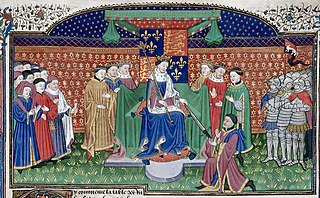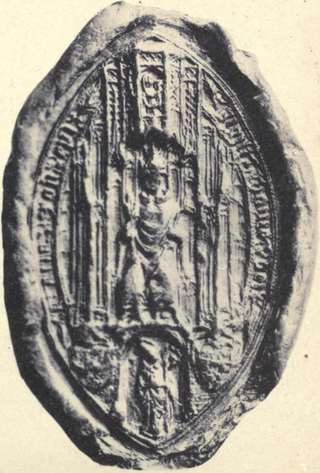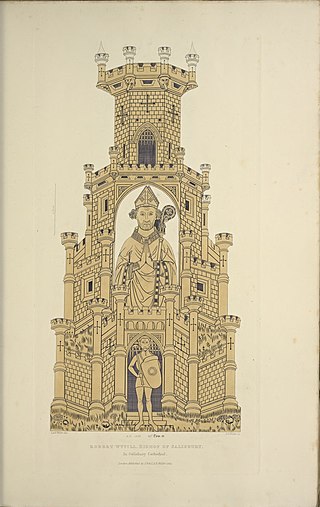William Courtenay was Archbishop of Canterbury (1381–1396), having previously been Bishop of Hereford and Bishop of London.

John Stafford was a medieval English prelate and statesman who served as Lord Chancellor (1432–1450) and as Archbishop of Canterbury (1443–1452).
Thomas Charlton was Bishop of Hereford, Lord High Treasurer of England, Lord Privy Seal, and Lord Chancellor of Ireland. He is buried in Hereford Cathedral in Hereford, Herefordshire, England.
Marmaduke Lumley was an English priest, Bishop of Carlisle from 1429 to 1450, and Knight Commander of the Order of St. John of Jerusalem. He was a son of Ralph de Lumley, 1st Baron Lumley and Eleanor de Neville. He was elected about 5 December 1429, and consecrated on 16 April 1430. He was Bishop of Lincoln for a short time before his death in December 1450. He was educated at University of Cambridge and was appointed Precentor of Lincoln Cathedral in 1425. He also became Chancellor of the University of Cambridge in 1427 and was Master of Trinity Hall, Cambridge from 1429 to 1443. From 1446 to 1449 he served as Lord High Treasurer of England. Lumley's tenure as Lord High Treasurer occurred during the Great Bullion Famine and the Great Slump in England.
William Alnwick was an English Catholic clergyman. He was Bishop of Norwich (1426–1436) and Bishop of Lincoln (1436–1449).

Thomas de Brantingham was an English clergyman who served as Lord Treasurer to Edward III and on two occasions to Richard II, and as bishop of Exeter from 1370 until his death. De Brantingham was a member of the Brantingham family of North East England.

John de Ufford was chancellor and head of the royal administration to Edward III as well as being appointed to the Archbishopric of Canterbury.
John of Thoresby was an English clergyman and politician, who was Bishop of St David's, then Bishop of Worcester and finally Archbishop of York. He was Lord Chancellor of England under King Edward III starting from 1349.
Robert Waldby was a native of York and friar of the Order of Saint Augustine who followed Edward, the Black Prince into Aquitaine, and undertook a number of diplomatic missions on his behalf. After studying at Toulouse, he became professor of theology there. He later became close to Edward's son, King Richard II. He was a firm opponent of John Wycliffe, wrote a book denouncing him, and was a member of the Synod which assembled at Oxford in 1382 to judge his orthodoxy.
Thomas Langley was an English prelate who held high ecclesiastical and political offices in the early to mid-15th century. He was Dean of York, Bishop of Durham, twice Lord Chancellor of England to three kings, and a Pseudocardinal. In turn Keeper of the King's signet and Keeper of the Privy Seal before becoming de facto England's first Foreign Secretary. He was the second longest serving Chancellor of the Middle Ages.

Thomas Hatfield or Thomas de Hatfield was Bishop of Durham from 1345 to 1381 under King Edward III. He was one of the last warrior-bishops in England.

Walter Skirlaw was an English bishop and diplomat. He was Bishop of Durham from 1388 to 1406. He was an important adviser to Richard II of England and Henry IV of England.
Robert Baldock was the Lord Privy Seal and Lord Chancellor of England, during the reign of King Edward II of England.
John Russell was an English Bishop of Rochester and bishop of Lincoln and Lord Chancellor.
Richard Clifford was a Bishop of London who had previously been Bishop of Worcester, Bishop-elect of Bath and Wells, and Lord Privy Seal.
Nicholas Bubwith (1355-1424) was a Bishop of London, Bishop of Salisbury and Bishop of Bath and Wells as well as Lord Privy Seal and Lord High Treasurer of England.
Richard de Wentworth was a medieval Bishop of London.
Robert Braybrooke (1336/7-1404) was a medieval cleric and King's Secretary. He was Dean of Salisbury and Bishop of London.
John Wakering was a medieval Bishop of Norwich.

Robert Wyvil was a medieval Bishop of Salisbury.







